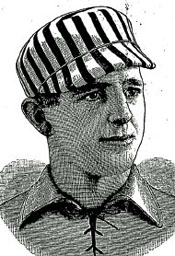
Charles Comiskey
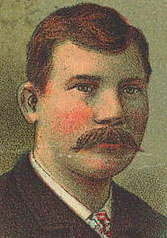
Chris Von der Ahe
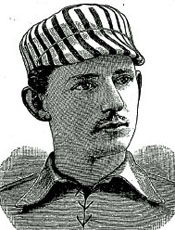
Yank Robinson
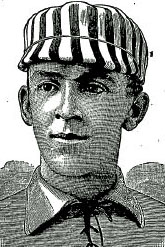
Dave Foutz

Bob Caruthers
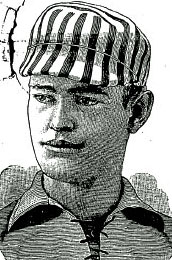
Tip O'Neill
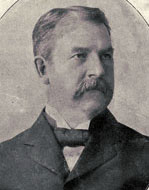
Albert Spalding
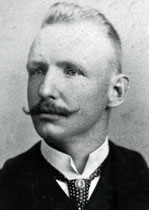
Cap Anson
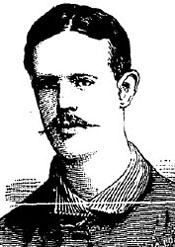
John Clarkson
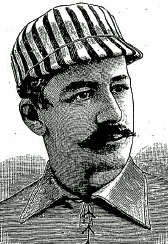
Arlie Latham
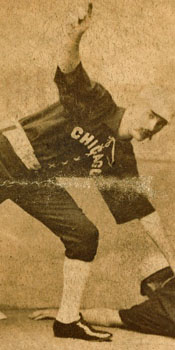
Fred Pfeffer
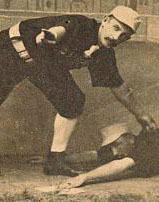
Tom Burns
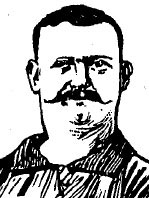
Jim McCormick
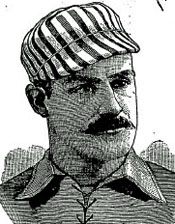
Curt Welch
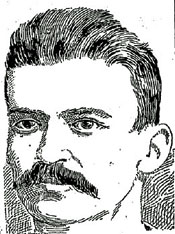
Mike "King" Kelly
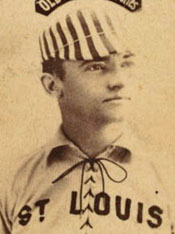
Nat Hudson

Albert "Doc" Bushong
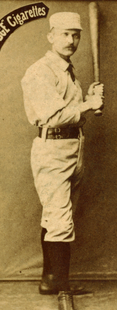
Abner Dalrymple
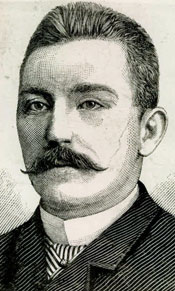
Ned Williamson
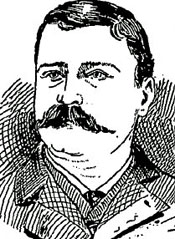
Umpire Grace Pearce
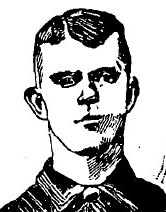
Jimmy Ryan
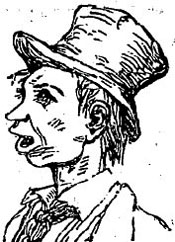
Chicago fan in stovepipe hat
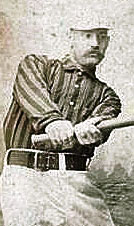
George Gore
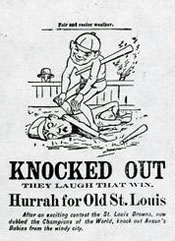
Poster after 1886 World Series
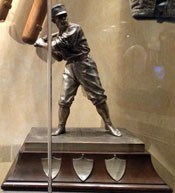
Wiman Trophy
|
Four Pennants in a Row - 1886
The St. Louis Browns won the American Association championship four straight years from 1885 to 1888.
The Browns became the St. Louis Perfectos in 1899 and the Cardinals the following year.
After two months, the Browns were tied for first with Brooklyn.
- From that point to the end of the season, the St. Louisans won 84% of their games to finish 47 games over .500 and take the pennant by 13 games.
- The main reason for the success of Comiskey's club is easy to find. Pitchers Dave Foutz and Bob Caruthers ranked 1-2 in ERA in the league and combined for 23 shutouts.
The Browns were looking that Caruthers pitched at all that season. A revised National Agreement signed by the owners of the rival leagues after the 1885 season set a $2,000 salary limit for all players. Caruthers informed Von der Ahe that he and C Doc Bushong were headed to Paris for the winter and would not return until April 1. Bob warned that he would stay in France and skip the season if he didn't get a better deal. Eventually, though, with no other options, "Parisian Bob" (as he came to be called) came back to St. Louis and signed for $2,000.
- Another strong point of the St. Louis club was their willingness to do whatever it takes to win. The manager himself exemplified this spirit in a game May 14 at Cincinnati. He barreled hard into the Redlegs' second-sacker to break up a double play and help the Browns win 2-1. The hometown fans were enraged since such an aggressive play was unheard of at the time. But, imitation being the highest form of flattery, the play soon became commonplace and continues to this day.
- The Browns hit .273, ten points better than any other club in the league, and scored 61 more runs than the next best team. St. Louis outscored their opponents by an amazing 352 runs!
- Using a tiny bat, Canadian native Tip O'Neill hit .328, good for fifth in the batting race, and led the league with 107 RBIs.
- With O'Neill behind him in the batting order, #2 man Arlie Latham scored a whopping 152 runs to top the Association.
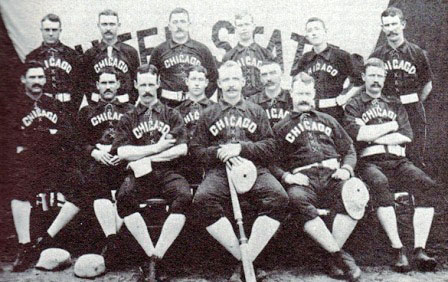
1886 Chicago White Stockings
The second "world championship series" between the champs of the American Association and the National League became more than just a set of exhibition games. It was the most talked about sporting event in American history to that point.
- The two owners, Von der Ahe and Albert Spalding, decided to play a best-of-seven, winner-take-all series starting in Chicago.
- Their intent was to make the players take the contests more seriously than they had the previous year, when Cap Anson's Chicagoans drank heavily each night and didn't play anywhere near the form that had propelled them to the pennant. Spalding wrote to the team promising each man a suit of clothes and half the gate receipts should they prevail in the series.
- The schedule called for three games in Chicago on consecutive days starting Monday, October 18, followed by three in a row in St. Louis. If neither team won the majority of the games, the teams would presumably split the proceeds or a seventh game would be arranged.
- Each team selected two umpires from the opponent's league, with each day's arbiter chosen from the four right before the game began - presumably to prevent bribery.
- Von der Ahe accompanied his boys to the Windy City to make sure they got a square deal. Several "local sporting reporters" made the trip from St. Louis as well.
Monday, October 18: Game One was played at the West Side Park in Chicago" before more than 5,000" spectators.
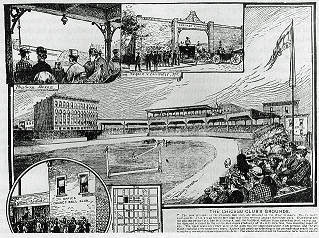
West Side Park c. 1885
- Chicago's ace, John Clarkson, 36-17 for the season, roundly outpitched Foutz 6-0. The Browns managed only five hits, two by Comiskey and two (including a triple) by Robinson. Clarkson fanned ten hitters. The White Stockings banged out 13 hits including a double and a triple. Part of the report in the New York Herald went like this:
The enthusiasm all through the contest was very great, and as the players of the champion team of the rival professional body were retired without scoring inning after inning the admirers gave full vent to their feelings and cheered themselves hoarse in urging the representatives of the League on to victory. Really there was more interest shown over the result of this game than any of the other games played in Chicago this season.
Anson won the toss and elected to bat last. 3B Arlie Latham led off and bunted foul nine times (there being no rule yet decreeing that a foul bunt with two strikes was a strikeout). With the fans yelling "play ball," Arlie finally struck out.
In the bottom of the first, a walk, a triple by Anson, and a "daisy-cutter to right" plated two.
No one crossed the plate again until the bottom of the 6th. 2B Fred Pfeffer opened with a single and went to 2nd on a ground out. 3B Tom Burns hit a fly to Caruthers, who played RF when Foutz pitched (and vice-versa). The throw to 3rd to head off the runner trying to advance got past Latham, allowing Pfeffer to score.
Chicago polished off the Browns with three in the 8th.
Tuesday, October 19: Game Two - West Side Park, Chicago. "Between 8000 and 9000 people" attended in "decidedly warm and pleasant" weather
Wednesday, October 20: Game Three - West Side Park, Chicago. Austin's First Regimental Band was in attendance to serenade the crowd estimated at 6,000. John Kelly umpired the contest alone.
- For the third straight day, "cranks" (fans) hoping to see a competitive game were disappointed. Emboldened by his success in Game Two, Caruthers convinced Comiskey to let him take the hill again but with disastrous results. Chicago took a two-games-to-one lead with an 11-4 triumph. Clarkson again puzzled the visitors, holding them to nine hits, only one of which was for extra bases, a double by CF Curt Welch. Meanwhile, C "King" Kelly pounded three of the White Stockings' eleven hits.
Caruthers issued four bases on balls in the first inning but none after that. The Browns were still in the game after six innings, trailing only 6-3 but Chicago scored three in the 7th and two more in the 8th.
The 9th inning was not played because of darkness.
Some Browns were upset that Comiskey had allowed Caruthers to start his second game in a row, preferring 17-year-old Nat Hudson who had won 16 and lost 10 during the regular season. SS Bill Gleason: It was dead wrong to put him in. We all wanted Hudson and we made a special request that Hudson be pitcher Caruthers insisted on going in, and why they put him in, I don't know. Hudson was anxious to pitch and understood he was going to until the last minute. From the very start, we all knew how the thing was going, and when the Chicagos took four base on balls, that settled it. Even then it was not too late, and I heard that Mr. Von der Ahe told Comiskey to bring Hudson in from the field, but why it wasn't done, I don't know.
McCormick didn't travel to St. Louis. Anson told the press that the big righthander had "rheumatism in his legs." Mac would pitch one more season for Pittsburgh before retiring from the game.

Sportsman's Park, St. Louis 1886
Thursday, October 21: Game Four - Sportsman's Park, St. Louis. 10,000 persons ("fully 12,000" according to one report) turned out for the 3:15 contest despite "quite cold" weather. Joe Quest officiated.
- The Browns evened the series with an 8-5 victory in a game limited to 6 1/2 innings by darkness. This time it was Chicago manager Anson who made the mistake of letting one of his aces take the hill for a second straight day. Clarkson gave up just one more hit (seven) than Foutz on the other side but walked six (two more than Foutz). But Foutz and Burns clubbed doubles while O'Neill added a triple.
The game started poorly for the home team when the first four Chicagoans reached base, and three of them crossed the plate. A walk to Pfeffer with the bases loaded sent home the first run. Then Kelly scored on a ground out. The visitors executed a neat double steal, Pfeffer taking 2nd as Anson came home on C Doc Bushong's bad throw.
While Foutz settled down and hurled four straight scoreless frames, the Browns pecked away at the lead with single runs in the 2nd and 3rd before taking the lead in the 5th. Pfeffer muffed two straight chances at 2nd. Gleason scored all the way from 2nd when Comiskey hit into a 6-4 forceout, Pfeffer failing to throw the runner out at home. (Three straight bad plays by the Chicago second sacker makes one suspect foul play.) A one-out Pfeffer bobble started the Browns on their way to their second run in the next inning, Caruthers scoring when O'Neill clouted a three bagger but was thrown out at home.
In the 5th, a one out walk to Bushong followed by Latham's single put men on 1st and 2nd. Each runner moved up on a groundout. Comiskey ordered Clarkson to pitch to O'Neill but the hurler disobeyed orders and walked the Browns' best hitter intentionally. Gleason's single over 2nd on an 0-2 pitch brought home the tying and go-ahead runs. Comiskey's hit to CF sent home O'Neill.
The visitors tied the game in the 6th. A single, a triple by Abner Dalrymple, and another single by Clarkson did the trick.
But St. Louis bounced right back to take the lead for good. Two walks sandwiched around a single loaded the bases with one out. Caruthers then hit a high fly that SS Ned Williamson muffed. He got the force at 2nd but Robinson scored from 3rd. O'Neill walked before the cleanup man, Gleason, came through again with a single to CF to plate two runners. 8-5 St. Louis
Following a 1-2-3 top of the 7th, Quest called the game on account of darkness.
Observing the White Stockings at their hotel that evening, Jerry Lanche wrote, The White Stockings, with the exception of Cap Anson, seemed strangely undisturbed by their loss. The team stood around smoking big black cigars, toasting each other with champagne, and joking with reporters. Clarkson was in especially good humor. Shortstop Ned Williamson smiled enigmatically and said, "Yes, sir, they beat us today on the level." King Kelly told funny stories to a group of friends. More than one reporter wondered whether at least some of the White Stockings, Pfeffer and Williamson in particular, had bet on the Browns that day.
Anson argued angrily with a reporter who asked him if his team had exerted maximum effort.
Friday, October 22: Game Five - Sportsman's Park, St. Louis. The new umpiring setup unveiled for Game Two was resurrected. Quest umpired for Chicago, McQuade for St. Louis (in place of Pearce who failed to show up), and Kelly refereed between the pitcher's box and 2B. Warmer weather brought out the largest crowd of the series, 16,000. The stands were full an hour before the first pitch.
Anson surprised everyone by starting SS Williamson, who hadn't pitched in a single game all season. Clarkson needed another day of rest, but Jocko Flynn, a solid third starter all season with a 23-6 record, would seem to have been the logical choice.
- One wire service article summarized the St. Louis victory like this: The playing on both sides was very loose, the batting heavy and the errors numerous. The Chicagos seemed for once to have lost confidence in themselves, and played a wretched game both at the bat and in the field.
Williamson didn't finish the first inning. RF Jimmy Ryan, another non-hurler, replaced him, holding the Browns to two opening inning tallies. But after three innings, the lead stretched to 7-2, and St. Louis coasted to a 10-3 triumph to take a 3-2 lead in games.
Caruthers with three and O'Neill and Gleason with two each got the majority of St. Louis's eleven hits while the White Stockings got just three off the Browns' surprise starter, Nat Hudson, who had won 17 against 10 losses as Comiskey's #3 starter.
Like its predecessor, this game was stopped after the top of the 7th because of darkness.
Anson never explained his decision to start Williamson. Had Flynn joined the drunkards?
The Chicago News reporter wrote: The hippodrome (one side not playing to win) was so artistically played that there was really no inclination to cry out against it ... The champion League club, having in its membership such pitchers as Clarkson, McCormick, Flynn and Baldwin, disdained the services of all these gentlemen and put in the box the very estimable short stop of the nine ... We presume to say that if such a shameless face had been attempted here in Chicago the conspirators and co-conspirators would have been hooted off the field.
Saturday, October 23: Game Six - Sportsman's Park, St. Louis. At Spalding's insistence, game time was moved up to 2:30 to make sure a full contest could be played before darkness set in. Grace Pearce, the truant umpire from Friday, officiated by himself. That fact was looked upon by some as bad for the Browns since Pearce was a National League arbiter.
Pearce vehemently denied that he had ever said that he had it in for the Browns. I never made use of such expression in my life, and the man who started such a rumor lied.
A threat of rain held down the crowd until a half hour before game time when clearing skies brought a last minute rush that filled the stands again with a throng slightly larger than the day before. "During the game there were two or three little rain spells but not enough to dampen the ardor of the spectators or weaken the energies of the players." Plenty of wagering took place.
Chicago owner Spalding brushed aside any suggestion that either club would not play their hardest. All this talk about hippodroming is based on such ignorance of human nature ... Each club is playing for the entire receipts and nothing else, and when the series is won, the winning club will get all the money. ... Do they suppose for a minute that any men of standing in the business community like Von der Ahe and myself are going to hazard our good name by going into a scheme like this?
The fans certainly looked forward to the most exciting game of the series. The reporter for the Chicago Daily Inter Ocean wrote about the afternoon this way:
There is no disguising the fact that the entire match, and especially to-day's game, has been a bitter contest. It has been war - not a friendly struggle - and much bad blood has been engendered between the two clubs, their members and manager. The battle has been for fun - not for fun. The public interest has been intense. Your correspondent never but once before saw the people so worked up on anything or so anxious for news. That once was when returns from New York were coming in just after the last Presidential election. The same great crowds hung around the newspaper bulletin boards this afternoon, and the same quantity and quality of enthusiasm was shown as bulletins were posted.
- Each side went with one of its aces - Caruthers for St. Louis and Clarkson for Chicago.
Both were up to the task.
Before the game, Clarkson harkened back to Game One when Latham opened the contest by bunting foul nine times. Let Latham dare to attempt his fouling business today and I'll show him that two can play at that game. I'll put every ball over the plate and make him hit it or go out on strikes. ... If he comes any monkey business, he will get the worst of it.
Anson appeared more silent and cautious than usual. I am as satisfied that we will win this game as I am that I am alive.
After a scoreless 1st, the White Stockings almost squandered an excellent chance to take the lead in the 2nd. Pfeffer led off with a single, then stole 2nd and went to 3rd on a passed ball with none out. But the crowd breathed easier when Caruthers struck out Williamson and Burns. However, Jimmy Ryan came through with a clutch two-out hit to make it 1-0 Chicago.
When the run scored, a young man in the LF bleachers who wore "a badly crushed stovepipe hat" shouted "Hurrah for Chicago." According to The Sporting News, a moment later he was engaged in mortal combat which ended in his being knocked down and then dragged out.
The top of the 3rd saw 3B Latham make a bad play, then a good one to avoid trouble. With one out, Arlie made a splendid stop, then threw wildly on George Gore's grounder, the runner ending up on 3rd. But Kelly knocked the ball to the third-sacker who nailed Gore at the plate.
The crowd grew restless in the bottom of the 3rd when Pearce ruled strike three on Bushong and then called two more questionable strikes on Latham.
With a slight rain falling, Pfeffer pounded the first HR of the series, the ball going over Fontz's head and landing among the benches in far RCF. Two singles and a passed ball put runners on 2nd and 3rd but Caruthers retired his opposite number of a fly to keep the score 2-0.
As the Browns took the field for the top of the 5th amid heavy rain, Comiskey argued that the game should be delayed until the rain stopped. But Pearce, after looking at his watch, ordered that play proceed. At that point, the crowd took matters into their own hands, overrunning the diamond. Confusion reigned, with much loud talking and exchange of opinions about the umpiring. Finally, owner Von der Ahe ordered Comiskey to put his men back on the field, the police herded the fans back into the stands, and the game resumed. The rain stopped for good in the bottom of the 5th.
Chicago extended its lead to 3-0 in the top of the 6th
when the Browns made three miscues during Pfeffer's at-bat. First, Comiskey muffed a foul fly. Given a second chance, Fred whizzed a grass cutter between 2B Robinson's legs. When RF Foutz also failed to field the ball, the batter ended up on 3rd from where Williamson's long fly scored him.
In the bottom of the 7th, O'Neill finally got the Browns' first hit, a triple to RCF. But he spoiled the feat by overrunning 3rd and being put out.
Pitching for the fourth time in six days, Clarkson finally tired in the 8th. Comiskey singled to RF, only the Browns' second hit. Then Welch bunted
toward 3B Burns who thew wildly to Anson, the St. Louis skipper ending up on 3rd and the batter making it to 2nd. So great was the enthusiasm at this juncture that play was stopped several minutes. Foutz's fly finally broke the scoring ice for the home team and sent Welch to 3rd. After Robinson's fly didn't travel far enough for the runner to score, Bushong drew a free pass to bring up Latham.
When Chicago was at-bat, Anson stationed himself in the 3B "coacher's box" near Arlie and did his best to rattle him. Cap yelled to his hitters, Knock it right down here! This is the weak spot. Here's our puddin'. A strong proponent of what today is called "trash talking," Latham had stayed unusually quiet all game, but when he stepped up to the plate in this inning, he shouted to Bushong on 1st, Stay there, Bush, and I'll bring you both in.
In LF, Dalrymple moved from his usual straightaway spot to a position nearer the foul line where Arlie often hit. Before a pitch was thrown, C Kelly called the attention of the umpire to Arlie's bat, which had a flat side. Pearce ruled the club illegal, forcing Latham to get another. That provoked the crowd, who began regaling the ump with chants of "Ten men!" When play resumed, the 3B took strike one. As the crowd expressed their disappointment, the pesky 5'8" third sacker stepped out of the box and held up a hand. Don't get nervous, folks. I'll bring them in. delivered the hit the fans had waited all afternoon for. Arlie caught one of Clarkson's low balls and lifted it toward the spot that Dalrymple had abandoned in LF. The ball sailed over Abner's head for a triple that plated the tying runs. The Chicago reporter wrote: This tied the game, and the behavior of the crowd was more like that of a tribe of Comanches than of civilized people. Another wrote, Men beat the wooden railing with their hands. ... Ladies jumped to their seats, screaming, and fluttered their tiny handkerchiefs. When the tumult finally subsided, men circulated through the crowd making new bets. Clarkson induced Caruthers to bounce out 5-3, stranding the go-ahead run on 3rd.
Afterwards, Spalding and almost all his players thought Dalrymple should have caught Latham's triple.
So the final game of the long season entered the top of the 9th all knotted up. Burns doubled and reached 3rd on a one-out sacrifice, but Caruthers whiffed Dalrymple to end the threat. In the bottom of the inning with the crowd ready to erupt, Clarkson returned to his earlier form and set down the Browns in order, although the second out came on Ryan's "remarkable jumping catch" of O'Neill liner to RCF..
The people seemed fairly frenzied with the excitement of the occasion. Nine innings played, the game tied, and the world's championship and a fortune at stake.
Now it was Caruthers' turn to mow down the enemy 1-2-3.
With their second chance for a walk-off win and the title, the Browns came through. Welch was hit by a pitch, but umpire Pearce, badgered by Anson, ruled the batter had not made an effort to get out of the way and refused to award him a base. The decision provoked little protest from the crowd as fans had seen Curt use the ploy all season long. But the Browns CF quieted the unruly crowd by singling to CF. Foutz then sent a "difficult grounder" to Williamson. Perhaps hurrying to start a DP, the SS fumbled the ball and got no one. With the crowd on its feet calling on him to "hit her out," Robinson obeyed Comiskey's sign and bunted the runners over. As Bushong approached the plate, Kelly very comically got down on his knees and reverentially handed "Bush" his bat. But the St. Louis backstop would not need it. He took a pitch near his head for ball one. Then came the fateful pitch. Kelly signalled for a low ball, but, as Clarkson started his windup, he noticed Welch breaking for the plate. So he fired "an ugly up-shoot" that hit off Kelly's hands toward the backstop. With Comiskey running close behind him from the 3B coach's box, Welch could have crossed the plate standing up but instead scored the winning run with what immediately became known as the "$15,000 slide" (although the amount the Browns received from the six games fell about $1,100 short of that figure). Comiskey gathered up the ball as it caromed off the backstop and put it in his pocket as a souvenir. Kelly shook both fists in the air and threw his glove and mask high over the grandstand. He cursed all the way to the visitors' dugout.
Reporters vied with each other to describe the pandemonium.
Never before was such a scene witnessed on the ball field. Men leaped out of the Grand stand and open seats, surrounded the Browns and cheered like mad. Others more enthusiastic than the rest picked up the Brown stocking players and carried them off the field. ... Anson and several of the Chicagos got right off the field. Williamson and Kelly walked over to the Browns' dressing room where they shook hands with ... the St. Louis players on their victory. The Browns, to keep the crowd out of their dressing room, barricaded its door. Still an immense crowd remained without cheering and shouting for the Browns without a half for fully half an hour. Then as each Brown stocking came out dressed in civilian garb he was seized and shaken by the hands and arms.
Meanwhile the White Stockings got in their carriages and drove away with little interference.
The normally parsimonious Von der Ahe ordered champagne for the players and also for the fans who stayed.
Another Daily Inter Ocean writer described the scene in Chicago during the final game. There was a very deep-feeling interest in the contest in this city. Early in the afternoon the various bulletin boards were surrounded by small crowds of expectant watchers. When the seven inning was reached, and the game stood Chicago 3, St. Louis 0, the enthusiasm was unbounded. The crowds at Tabers', Spaldings' and other places where the scores were posted, grew larger, and when the report of the eighth inning was posted showing a tie, the feeling was intense. In front of Spaldings' the sidewalk was blocked with the crowd. The collapse came when the last report was received showing that the Browns had won the contest. The crowds were stunned almost, and men turned away filled with disgust. No one said "hippodrome," because it was too plain that the St. Louis club was out for "blood." ... A visit to all the pool-rooms last evening disclosed the fact that less than $2,000 was wagered on the result.
- Welch's run came to be known as the "$15,000 slide".
- Receipts of $2,500 for Game Six swelled the total to $12,920 for the Series. So the twelve Browns players took home $580 apiece. The remaining $8,960 went to Von der Ahe who paid the salaries of the umpires and other expenses.
Saturday evening, Von der Ahe sent a telegram to Spalding: What do you say if we play off that game in Cincinnati, on Tuesday, anyhow. Spalding replied promptly. Friend Von der Ahe: We must decline with our compliments. We know wen we have had enough. P.S.-Anson joins me in the above message.
- Sunday, October 24, the Browns played an exhibition game at Sportsman's Park against the St. Louis Maroons of the National League. At the end of the fifth inning, a ceremony was held to award "the magnificent trophy" offered by Erastus Wiman to the Browns for winning the championship of the American Association. The presentation was made by Kelly, Williamson, and Flint of the White Stockings who stayed in the city. Von der Ahe turned the award over to the players after a brief speech. Fans contributed several impressive floral displays for their heroes.
The appearance of the three Chicagoans may not have been as altruistic as it appeared. Disgusted with his team's performance in the series, Spalding had refused to pay their train fare back to Chicago. Some of the players had bet so much on the series that they were broke. Von der Ahe generously advanced them money to get home.
References:The Spirit of St. Louis: A History of the St. Louis Cardinals and Browns, Peter Golenbock (2000)
|


























